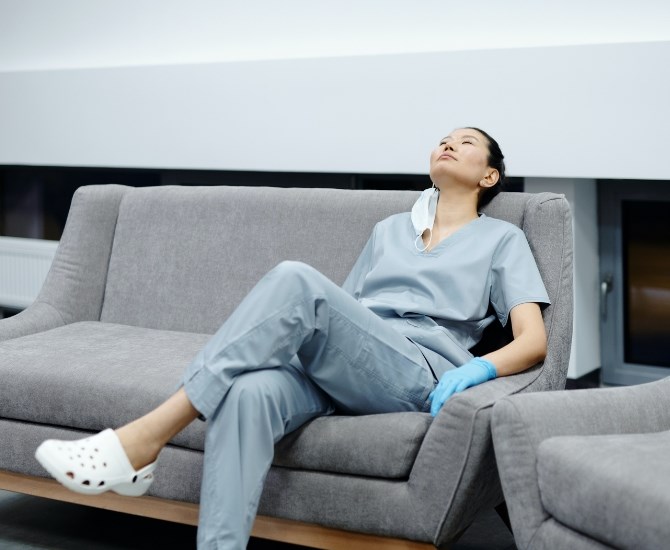
FILE PHOTO.
Image Credit: PEXELS
June 10, 2022 - 5:03 PM
Staffing for the acute psychiatric ward in Royal Inland Hospital in Kamloops is reaching critically low levels that’s stressing out regular staff.
As of yesterday afternoon, June 9, only one nurse was scheduled for tonight’s night shift, a nurse who works in that unit told iNFOnews.ca today. She was given anonymity because of likely job repercussions.
Interior Health says there are six nurses scheduled to work tonight but the anonymous nurse is concerned about the qualifications those nurses have for dealing with people with severe psychiatric problems.
Last weekend, for the first time, community care nurses were called in, the nurse said.
“They have no Code White experience,” the nurse said. “They can’t give medication. They can’t chart.”
The nurse described Code White as: “When you have an aggressive patient and have to go hands on, call security or give medications or lock them in their room.”
If a community nurse helps out in such a situation they won’t be covered by the Workers Compensation Board, the nurse said.
There are a number of reasons that the unit is in a staffing crunch.
A couple of months ago, 10 licenced practical nurses who worked on 1 South were let go, the nurse said.
“They all had a passion for mental health,” the nurse told iNFOnews.ca. “Some of them had worked there for 10-plus years. Some went to long term care. Some went casual. Some of them went back to acute care.”
They’re not able to take shifts in 1 South anymore.
Not only is the pool of replacements smaller but the experience level of those who remain is decreasing since many regular staff are off sick, have gone into the casual pool or simply quit.
The one scheduled for tonight has two years experience, the nurse said.
“We have new staff now who don’t know what they’re doing,” the nurse said. “It’s scary. You’re dealing with people who are acutely mentally ill.”
The community nurses who worked last weekend were not trained for hospital or psych ward work and have limited qualifications to perform certain tasks.
“Our manager, she was like: ‘Isn’t it nice to have social workers on the weekend? Isn’t it good to have bodies on the floor,’” the nurse said. “Is it that helpful? Have you asked staff that worked last weekend where there was community social workers?... Other than being a body on the floor and doing some rounds, they’re about as useful as a care aid.”
Care aids have six months training.
“Care aids are good for warm bodies on the floor, taking vitals,” the nurse said, referring to ones working in the Emergency Ward. “They can’t say, this person’s blood pressure is tanking, what are we going to do? They can’t give medications. They can’t chart. It’s good to have a body on the floor but they don’t have the education, skills or training, to be able to critically think and maybe save somebody’s life.”
Royal Inland has been struggling with serious staff shortages for quite some time. The nurse said it’s gotten much worse over the last couple of months but traces the roots of the problem back many years.
READ MORE: RIH patients may be transferred in urgent response to weekend staffing shortages
At one time, the hospital had a “Float Pool” with about 10 nurses who worked full-time but were happy to be assigned to various departments rather than stick to just one unit.
That pool was eliminated a number of years ago and replaced with casuals being hired when needed or full-time staff who pick up overtime shifts.
To compound the problem, Royal Inland is the only hospital to use a displacement system, the nurse said.
That means, if one unit is really short staffed, nurses will be reassigned from other departments.
“No one is going to pick up (shifts),” the nurse said. “If you work in acute care you don’t want to go to mental health. If you work medical, they’ll redeploy you to Intensive Care. That creates a lot of tension and anxiety with staff. They don’t want to pick up and be redeployed. ‘A nurse is a nurse is a nurse.’ That is not true. You go into OR (Operating Room). You go into ER (Emergency Room). You go into an area where you like to work.”
That system may be changing, according to Interior Health President and CEO Susan Brown who met with nurses last month and talked to iNFOnews.ca about that meeting on May 27.
“What I did hear from the staff yesterday is that redeployment from one unit to another is stressful on them so we need to look at ways of resolving that quickly,” Brown said at the time. “There will be ongoing conversations with the physicians and the nurses at the site around how we approach that.”
READ MORE: How Interior Health is planning to tackle RIH understaffing issues
This nurse has experience in other hospitals in the Interior Health region that provide better working environments with support and encouragement for workers.
Management is to blame, the nurse said.
iNFOnews.ca asked Interior Health a number of questions about the situation in 1 South but the only answer received was about the six nurses for tonight’s shift with no clarification of their qualifications.
To contact a reporter for this story, email Rob Munro or call 250-808-0143 or email the editor. You can also submit photos, videos or news tips to the newsroom and be entered to win a monthly prize draw.
We welcome your comments and opinions on our stories but play nice. We won't censor or delete comments unless they contain off-topic statements or links, unnecessary vulgarity, false facts, spam or obviously fake profiles. If you have any concerns about what you see in comments, email the editor in the link above.
News from © iNFOnews, 2022